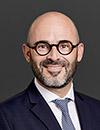Plenary Event
Nanoscience + Engineering Plenary
4 August 2025 • 8:30 AM - 9:55 AM PDT | Conv. Ctr. Room 6A
Session Chairs: Sonja Franke-Arnold, Univ. of Glasgow (United Kingdom); Giovanni Volpe, Göteborgs Univ. (Sweden)
8:30 AM - 8:35 AM:
Welcome and Opening Remarks
8:35 AM - 9:15 AM:
Revisiting biosensing using digital holography
Multiplexed analyte sensing in biological samples is crucial for detecting diseases and therapeutic monitoring, yet remains a challenge because of sample heterogeneity. This talk introduces a novel approach combining digital holography, microfluidics, and engineered supported lipid bilayers for label-free biosensing. We demonstrate size-specific, single particle-based, multiplexed immunoassays targeting extracellular vesicles and proteins. Beyond fingerprinting heterogeneous populations, by leveraging polarization-sensitive holographic imaging, we also reveal spatially resolved chirality, including enantiomeric excess, normally obscured by ensemble averaging. Our approach unlocks new dimensions in biosensing, paving the way for advanced diagnostics and fundamental biological insights.
Romain Quidant earned his PhD in Physics from the University of Dijon, France in 2002. He then completed a postdoctoral stay in the newly created ICFO in Barcelona, where he subsequently rose through the ranks to become a tenured Professor in 2009. In 2020, he transitioned to ETH Zurich as a full Professor and head of the Institute of Energy and Process Engineering. His research has been recognized with three ERC grants and several international and national prizes. Since 2022, he is also the Editor-in-Chief of ACS Photonics.
9:15 AM - 9:55 AM:
Computational microscopy with algorithmic self-calibration
Computational imaging is permeating cameras and microscopes across many scientific applications, enabling new high-resolution and multi-dimensional measurement capabilities (e.g. phase, 3D, hyperspectral). Many methods require acquisition of multiple images across a large field-of-view, so motion blur and aberrations can cause severe artifacts. This talk will describe new space-time algorithms that correct aberrations and motion artifacts with imperfect optical systems or approximate forward models. Traditional model-based image reconstruction algorithms work together with neural networks to optimize the inverse problem solver and the data capture strategy.
Laura Waller is the Charles A. Desoer Professor of Electrical Engineering and Computer Sciences at UC Berkeley. She received B.S., M.Eng. and Ph.D. degrees from the Massachusetts Institute of Technology in 2004, 2005 and 2010. After that, she was a Postdoctoral Researcher and Lecturer of Physics at Princeton University from 2010-2012. She is a Packard Fellow for Science & Engineering, Moore Foundation Data-driven Investigator, OSA Fellow, and Chan-Zuckerberg Biohub Investigator. She has received the Carol D. Soc Distinguished Graduate Mentoring Award, OSA Adolph Lomb Medal, the SPIE Early Career Award and the Max Planck-Humboldt Medal.
MENU: Coffee, decaf, and tea will be available outside the presentation room.
SETUP: Theater style seating.
8:30 AM - 8:35 AM:
Welcome and Opening Remarks
8:35 AM - 9:15 AM:
Revisiting biosensing using digital holography
 |
Romain Quidant
ETH Zürich (Switzerland) |
Multiplexed analyte sensing in biological samples is crucial for detecting diseases and therapeutic monitoring, yet remains a challenge because of sample heterogeneity. This talk introduces a novel approach combining digital holography, microfluidics, and engineered supported lipid bilayers for label-free biosensing. We demonstrate size-specific, single particle-based, multiplexed immunoassays targeting extracellular vesicles and proteins. Beyond fingerprinting heterogeneous populations, by leveraging polarization-sensitive holographic imaging, we also reveal spatially resolved chirality, including enantiomeric excess, normally obscured by ensemble averaging. Our approach unlocks new dimensions in biosensing, paving the way for advanced diagnostics and fundamental biological insights.
Romain Quidant earned his PhD in Physics from the University of Dijon, France in 2002. He then completed a postdoctoral stay in the newly created ICFO in Barcelona, where he subsequently rose through the ranks to become a tenured Professor in 2009. In 2020, he transitioned to ETH Zurich as a full Professor and head of the Institute of Energy and Process Engineering. His research has been recognized with three ERC grants and several international and national prizes. Since 2022, he is also the Editor-in-Chief of ACS Photonics.
9:15 AM - 9:55 AM:
Computational microscopy with algorithmic self-calibration
 |
Laura Waller
Univ. of California, Berkeley (United States) |
Computational imaging is permeating cameras and microscopes across many scientific applications, enabling new high-resolution and multi-dimensional measurement capabilities (e.g. phase, 3D, hyperspectral). Many methods require acquisition of multiple images across a large field-of-view, so motion blur and aberrations can cause severe artifacts. This talk will describe new space-time algorithms that correct aberrations and motion artifacts with imperfect optical systems or approximate forward models. Traditional model-based image reconstruction algorithms work together with neural networks to optimize the inverse problem solver and the data capture strategy.
Laura Waller is the Charles A. Desoer Professor of Electrical Engineering and Computer Sciences at UC Berkeley. She received B.S., M.Eng. and Ph.D. degrees from the Massachusetts Institute of Technology in 2004, 2005 and 2010. After that, she was a Postdoctoral Researcher and Lecturer of Physics at Princeton University from 2010-2012. She is a Packard Fellow for Science & Engineering, Moore Foundation Data-driven Investigator, OSA Fellow, and Chan-Zuckerberg Biohub Investigator. She has received the Carol D. Soc Distinguished Graduate Mentoring Award, OSA Adolph Lomb Medal, the SPIE Early Career Award and the Max Planck-Humboldt Medal.
Event Details
FORMAT: General session with live audience Q&A to follow presentations.MENU: Coffee, decaf, and tea will be available outside the presentation room.
SETUP: Theater style seating.
